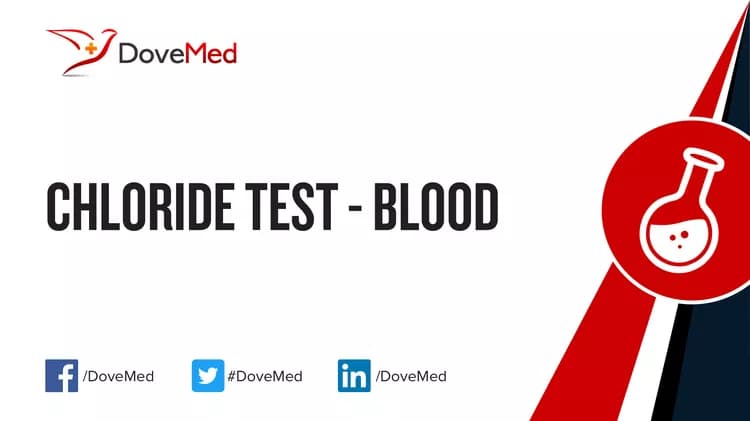What are the other Names for this Test? (Equivalent Terms)
- Serum Chloride Test
What is Chloride Blood Test? (Background Information)
- Chloride is an anion (negatively charged ion) that helps in regulating the body fluid amount and acid-base balance, along with sodium, potassium, and bicarbonate
- It is found in all body fluids, but is present in higher concentrations outside of the cells
- The body gets chloride through food; excess chloride is eliminated by the kidneys via urine
- Whenever the physician suspects any disturbance in the acid-base balance, or any changes in body fluid levels or electrolytes (ions present in body fluids), a Chloride Test is ordered
What are the Clinical Indications for performing the Chloride Blood Test?
Serum Chloride levels are usually measured along with other electrolytes, or as part of basic/comprehensive metabolic panels. Indications for Chloride Testing include:
- Suspected acid-base imbalance
- Conditions, such as prolonged vomiting, diarrhea, respiratory distress (which can produce acid-base disturbances)
- As part of electrolyte monitoring during the treatment of certain conditions, like high blood pressure, kidney disease, heart failure, or liver disease
How is the Specimen Collected for Chloride Blood Test?
Sample required: Blood
Process: Insertion of needle into a vein (arm).
Preparation required: None. Although, sometimes the physician may advise discontinuation of drugs, which are known to affect chloride levels, if deemed necessary.
What is the Significance of the Chloride Blood Test Result?
The normal range of values, called the reference range, may vary slightly amongst different laboratories. A common reference range for Serum Chloride is 96-106 milliequivalents per liter (mEq/L).
Increased levels of Blood Chloride, called hyperchloremia, may be produced by conditions, such as:
- Metabolic acidosis; caused by a loss of too much base from the body,which can occur during excessive diarrhea
- Respiratory alkalosis;caused when a person breathes in and out, too fast
- Kidney disease, such as renal tubular acidosis
- Drugs, such as acetazolamide (belonging to a class of drugs, called carbonic anhydrase inhibitors)
- Cushing syndrome
Decreased levels of Blood Chloride, called hypochloremia, may be caused by conditions, such as:
- Metabolic alkalosis; caused by loss of too much acid from the body, which can occur during excessive vomiting or gastric suction
- Respiratory acidosis; caused when a person does not get enough gas-exchange in lungs during breathing, and carbon dioxide accumulates in the body; in conditions like chronic lung disease
- Congestive heart failure
- Addison disease
- Kidney disease, like Bartter syndrome; an inborn condition wherein an individual’s kidneys are unable to reabsorb sodium and chloride from the urine
The laboratory test results are NOT to be interpreted as results of a "stand-alone" test. The test results have to be interpreted after correlating with suitable clinical findings and additional supplemental tests/information. Your healthcare providers will explain the meaning of your tests results, based on the overall clinical scenario.
Additional and Relevant Useful Information:
- Blood Chloride levels fluctuate concomitantly with sodium levels; but, during acid-base imbalances, chloride levels may change, independent of sodium levels
- Taking excessive antacids beyond the recommended dosage, or excessive baking soda, can lower Serum Chloride
Certain medications that you may be currently taking may influence the outcome of the test. Hence, it is important to inform your healthcare provider, the complete list of medications (including any herbal supplements) you are currently taking. This will help the healthcare provider interpret your test results more accurately and avoid unnecessary chances of a misdiagnosis.
Related Articles
Test Your Knowledge
Asked by users
Related Centers
Related Specialties
Related Physicians
Related Procedures
Related Resources
Join DoveHubs
and connect with fellow professionals


0 Comments
Please log in to post a comment.